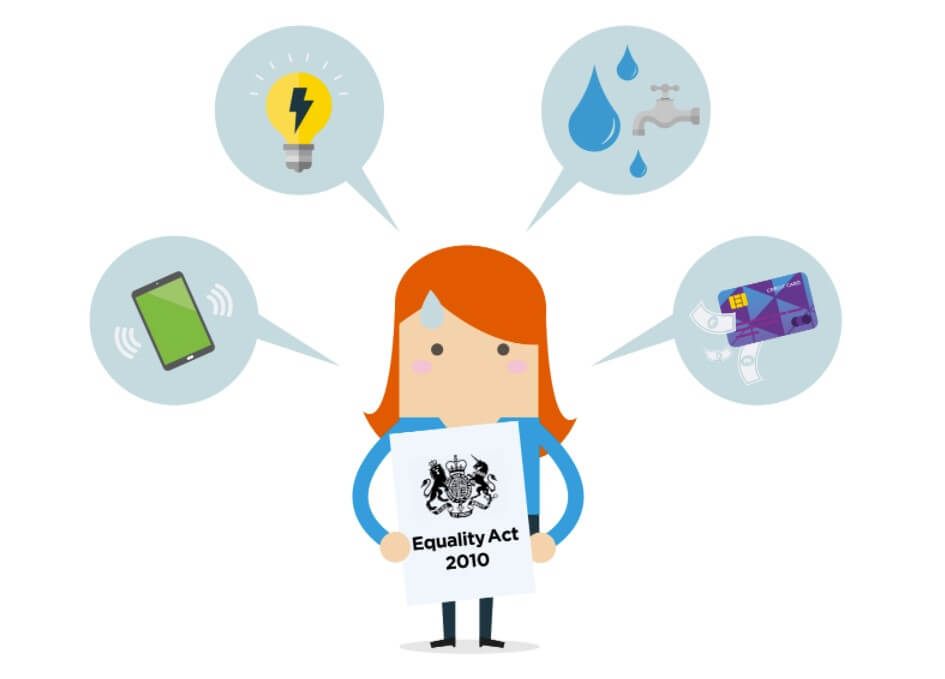
Conor D’Arcy, Head of Policy and Research, Money and Mental Health
People with mental health problems say they aren’t getting Equality Act protections from essential services companies
2 February 2022
If you go to your local bank branch, you might find a ramp to help people who use a wheelchair get in and out. If you receive a letter from your energy company, it will usually mention that you can request a large print or braille version to make life easier for people with impaired vision.
While lots more needs to be done to make places and services more accessible for people with physical disabilities, adjustments like these have become commonplace in the UK. That’s thanks in part to important legal protections – including those under the Equality Act. However, when it comes to making similar changes that would support people with mental health problems, there’s still a long way to go.
That’s the conclusion of a new report we’ve published today. Members of our Research Community – a group of thousands of people with lived experience of mental health problems – told us that firms often don’t seem to understand how their symptoms make it more challenging to engage with these services.
What harm is being done?
This failure to meet people’s needs can have a severe financial impact, with previous research showing that customers with mental health problems pay on average over £1,000 more for essential services, like financial products, energy and broadband. But it can also have a devastating psychological impact: 37% of people who have experienced mental health problems feel significant levels of anxiety when dealing with essential service providers, almost three times the rate among people who have never experienced mental health problems (13%).
“I can’t deal with them. I find it really frightening and overwhelming. I find a lack of understanding and flexibility. So many try to shoehorn you into ‘solutions’ that aren’t right and I frequently feel bullied or treated like I’m stupid.” Expert by experience
Are essential services firms complying with the law?
There’s a strong moral case for firms to step up but there’s also a legal requirement, in the form of the Equality Act 2010. It places a duty on firms to make “reasonable adjustments” for customers with disabilities, including mental health problems. The Equality and Human Rights Commission (EHRC) – the body tasked with overseeing the Act – says this is:
“to make sure that if you are a disabled person, you can use an organisation’s services as close as it is reasonably possible to get to the standard usually offered to non-disabled people.”
Unfortunately, people with mental health problems told us that, even after letting their essential provider know about their condition, additional support wasn’t always discussed with them – with one in three financial services customers saying this offer wasn’t made. While there could be disagreements over what is “reasonable”, which could ultimately be ruled on by a judge, the adjustments people with mental health problems commonly told us they’d value – different communication channels to get in touch, reminders when payments are due – do not seem excessive.
As well as this reactive responsibility, firms are also required to think ahead. The EHRC states that:
“an organisation cannot wait until a disabled person wants to use its services, but must think in advance (and on an ongoing basis) about what disabled people with a range of impairments might reasonably need.”
Despite this, only three in ten (29%) people with mental health problems told us that essential service providers usually anticipate and meet their needs.
What needs to happen next?
As with any law, the responsibility is first and foremost on those who it applies to, in this case, firms. They should make sure that they have a process in place to anticipate people’s needs, find out the difficulties people with mental health problems might encounter when using their services, and make adjustments easy to request and access.
Our research suggests that essential service firms don’t always take enforcement of the Equality Act as a serious threat, instead focusing on the issues emphasised by the regulators in their sectors, like the Financial Conduct Authority (FCA) or Ofgem. That’s why the FCA’s agreement with the EHRC, to work together on equalities issues in financial services, is so welcome. Greater collaboration like this, and reminding companies of their duties, could be a small but important contribution to changing firms’ thinking and practices.
It also appears that essential services has not been a priority area for the EHRC. The EHRC has a wide brief, covering many important issues, and a limited budget. But, with so many people with mental health problems telling us that some of the most basic actions required by the Act are not being taken by providers of vital services, there’s strong grounds for an EHRC investigation into these sectors.
In recent years, we’ve seen a positive shift in awareness of mental health problems, and encouragement from firms to their customers to talk about difficulties they’re facing. With the Equality Act having been in place for more than a decade, moving beyond talking to real change is what’s needed in these key sectors.
